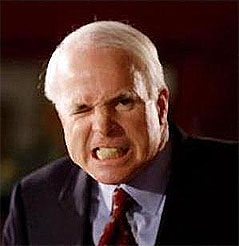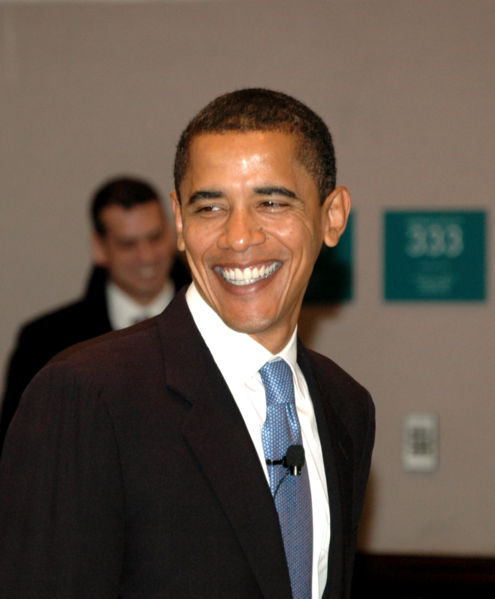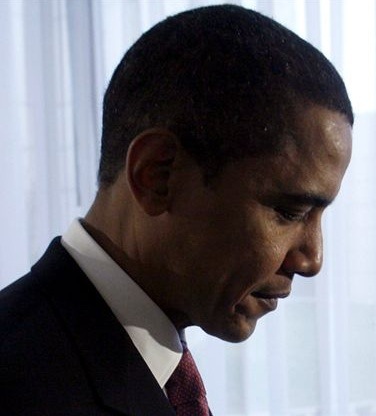 Seven years and six months into his administration, President Bush seems to have realized that Vladamir Putin isn’t always such a nice guy. The Wall Street Journal reported today that the administration is putting all bilateral contacts with Russia under review. This occurred after a near face-off between a Coast Guard cutter and the Russian navy. As I have written previously, we are at least in part to blame for the fiasco in Georgia, and so this can be seen as corrective at best, and palliative at worst. Just like his father, had President Bush sent strong messages (perhaps with soldiers) before the invasion, perhaps there never would have been one to begin with.
Seven years and six months into his administration, President Bush seems to have realized that Vladamir Putin isn’t always such a nice guy. The Wall Street Journal reported today that the administration is putting all bilateral contacts with Russia under review. This occurred after a near face-off between a Coast Guard cutter and the Russian navy. As I have written previously, we are at least in part to blame for the fiasco in Georgia, and so this can be seen as corrective at best, and palliative at worst. Just like his father, had President Bush sent strong messages (perhaps with soldiers) before the invasion, perhaps there never would have been one to begin with.
This was a win/win/win for Russia. They managed to demonstrate to the west and elsewhere that they will have their views taken seriously, they invaded the portion of a neighbor that has many Russians, and they may well have destabilized alternative energy transmission paths that the U.S. proposed, demonstrating the old axiom that all war is over wealth.
President Clinton reminded us at the Democratic National Convention this week that we as a nation cannot go it alone, that it is not in our best interest to go it alone, and that cooperation amongst nations is best for the United States. I am glad we are standing by Georgia, even if it is very late, and I hope that other countries will send stronger messages than they have until now. I am referring in particular to Germany and France.
 John McCain likes to think of himself as a straight talker. In general I think that’s true but it’s not always the case. I liked that he took his change of heart to support drilling off the coast of California to the environmental lobby and told them to their face (even though I hate the idea of drilling off the coast). Having heard him talk I like how he has handled opposition when dealing with abortion. Still, I dislike that he did in fact flip flop on drilling, and I don’t like that he refused to answer a simple question by the press, like, “How many houses do you own?”
John McCain likes to think of himself as a straight talker. In general I think that’s true but it’s not always the case. I liked that he took his change of heart to support drilling off the coast of California to the environmental lobby and told them to their face (even though I hate the idea of drilling off the coast). Having heard him talk I like how he has handled opposition when dealing with abortion. Still, I dislike that he did in fact flip flop on drilling, and I don’t like that he refused to answer a simple question by the press, like, “How many houses do you own?” Barak Obama has done very little negative campaigning. He has another quality, however, that I like. He has stated openly that he is not an idealogue. He seems to take every situation as it is presented to him and responds appropriately. This makes him perhaps a more difficult public speaker because he can’t just blat out the one liners. It makes him unpreditable at times.
Barak Obama has done very little negative campaigning. He has another quality, however, that I like. He has stated openly that he is not an idealogue. He seems to take every situation as it is presented to him and responds appropriately. This makes him perhaps a more difficult public speaker because he can’t just blat out the one liners. It makes him unpreditable at times. I typically surprise many of my friends with just how fiscally conservative I can be at times. I believe for some reason that people should get the government they pay for, and no more. To me that means not running a deficit. One of the best things we can do for our economy is balance the amount of money we’re taking in versus what is spent. I do not suggest that this needs to be done on a year by year basis, but rather on a decade by decade basis.
I typically surprise many of my friends with just how fiscally conservative I can be at times. I believe for some reason that people should get the government they pay for, and no more. To me that means not running a deficit. One of the best things we can do for our economy is balance the amount of money we’re taking in versus what is spent. I do not suggest that this needs to be done on a year by year basis, but rather on a decade by decade basis.
 At the same time he wants to cut taxes for the middle class as well as for senior citizens. Once again, Obama does not say how he would pay for all of the programs he mentioned. I don’t have a problem with the programs, or even the bill for those programs. But he has to say how he is going to pay for those programs.
At the same time he wants to cut taxes for the middle class as well as for senior citizens. Once again, Obama does not say how he would pay for all of the programs he mentioned. I don’t have a problem with the programs, or even the bill for those programs. But he has to say how he is going to pay for those programs. The customers of Best Western are the latest to
The customers of Best Western are the latest to  Senator Obama had his choice of huge range of individuals for vice president candidate. He could have picked Hillary Clinton, who has a solid constituency, or he could have picked Bill Richardson, who has a brain the size of the planet and represents the left well. Instead, he picked Senator Joseph Biden of Delaware, who received a whopping 1% of the vote in the primaries in which he participated. Biden has a less than distinguished carrier in the Senate that includes such debacles as the Anita Hill massacre, in which Clarence Thomas was confirmed as a justice of the Supreme Court, having been publicly shamed by his assistant. Biden chaired the mess.
Senator Obama had his choice of huge range of individuals for vice president candidate. He could have picked Hillary Clinton, who has a solid constituency, or he could have picked Bill Richardson, who has a brain the size of the planet and represents the left well. Instead, he picked Senator Joseph Biden of Delaware, who received a whopping 1% of the vote in the primaries in which he participated. Biden has a less than distinguished carrier in the Senate that includes such debacles as the Anita Hill massacre, in which Clarence Thomas was confirmed as a justice of the Supreme Court, having been publicly shamed by his assistant. Biden chaired the mess.